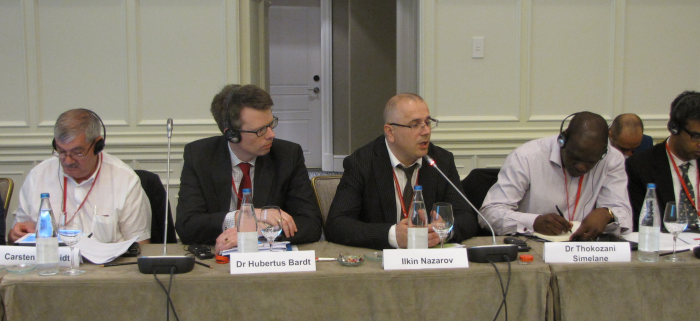Workshop on Developing a Skilled Workforce for Economic Diversification
Archive Economic Policy Forum

 Supported by the UN Development Programme, the Swiss Development Cooperation (DEZA), and the Economic Policy Forum (EPF), international experts, policy analysts and business representatives met in Baku on May 29-30 for a workshop on „Developing a Skilled Workforce for Economic Diversification“. Experiences and case studies from Azerbaijan, India, Indonesia, Vietnam, South Africa, Saudi Arabia as well as Germany and Switzerland served to present and exchange specific challenges in these countries, and to discuss strategies to address the often overwhelming mismatch between the needs and availability of specific skills in the labour markets.
Supported by the UN Development Programme, the Swiss Development Cooperation (DEZA), and the Economic Policy Forum (EPF), international experts, policy analysts and business representatives met in Baku on May 29-30 for a workshop on „Developing a Skilled Workforce for Economic Diversification“. Experiences and case studies from Azerbaijan, India, Indonesia, Vietnam, South Africa, Saudi Arabia as well as Germany and Switzerland served to present and exchange specific challenges in these countries, and to discuss strategies to address the often overwhelming mismatch between the needs and availability of specific skills in the labour markets.
Many emerging economies today prioritize skilling, training and employment strategies in their economic reform agendas as keys to developing a competitive workforce and to drive economic growth and diversification processes. However, as the presentations highlighted, persistent challenges are the lack of adequate involvement of the private sector, missing national and/or international training standards, and generally a waning esteem among young high school graduates for professional training programmes as higher education options often offer a better competitive advantage on the market.
Participants stressed the need for a more in-depth analysis of the reasons for such labour market failures in order to be able to develop concrete policy recommendations to remedy the supply-demand mismatch in skills. They also highlighted the need to develop integrated approaches and an incentive system in order to engage all stakeholders – business, government, academia, and civil society. It was agreed to conduct further research into, firstly, labour mobility and the impact regional integration processes have on skill development, and, secondly, drivers and incentives for a greater role of SMEs in national skilling programmes.



